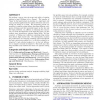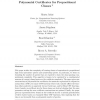140 search results - page 14 / 28 » Language Learning With Some Negative Information |
143
click to vote
KCAP
2011
ACM
14 years 4 months ago
2011
ACM
Some supervised-learning algorithms can make effective use of domain knowledge in addition to the input-output pairs commonly used in machine learning. However, formulating this a...
112
click to vote
ICAIL
2007
ACM
15 years 5 months ago
2007
ACM
We perform a survey into the scope and utility of opinion mining in legal Weblogs (a.k.a. blawgs). The number of `blogs' in the legal domain is growing at a rapid pace and ma...
116
click to vote
IANDC
2006
15 years 1 months ago
2006
This paper studies the complexity of learning classes of expressions in propositional logic from equivalence queries and membership queries. In particular, we focus on bounding th...
139
Voted
IIE
2007
15 years 1 months ago
2007
How do we teach children to express and communicate ideas in a formal and informal mode? What type of language do they need in a concrete context? How should they determine a prope...
114
click to vote
COGSCI
2004
15 years 1 months ago
2004
Disfluencies include editing terms such as uh and um as well as repeats and revisions. Little is known about how disfluencies are processed, and there has been next to no research...


